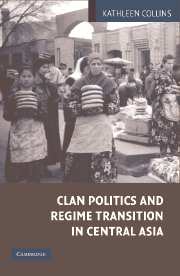Book contents
- Frontmatter
- Contents
- List of Tables and Figures
- Map of Central Asia
- Preface
- Acknowledgments
- Note on Transliteration
- 1 An Introduction to Political Development and Transition in Central Asia
- 2 Clan Politics and Regime Transition in Central Asia: A Framework for Understanding Politics in Clan-Based Societies
- 3 Colonialism to Stalinism: The Dynamic between Clans and the State
- 4 The Informal Politics of Central Asia: From Brezhnev through Gorbachev
- 5 Transition from Above or Below? (1990–1991)
- 6 Central Asia's Transition (1991–1995)
- 7 Central Asia's Regime Transformation (1995–2004): Part I
- 8 Central Asia's Regime Transformation (1995–2004): Part II
- 9 Positive and Negative Political Trajectories in Clan-Based Societies
- 10 Conclusions
- Epilogue
- Appendix
- Index
2 - Clan Politics and Regime Transition in Central Asia: A Framework for Understanding Politics in Clan-Based Societies
Published online by Cambridge University Press: 17 July 2009
- Frontmatter
- Contents
- List of Tables and Figures
- Map of Central Asia
- Preface
- Acknowledgments
- Note on Transliteration
- 1 An Introduction to Political Development and Transition in Central Asia
- 2 Clan Politics and Regime Transition in Central Asia: A Framework for Understanding Politics in Clan-Based Societies
- 3 Colonialism to Stalinism: The Dynamic between Clans and the State
- 4 The Informal Politics of Central Asia: From Brezhnev through Gorbachev
- 5 Transition from Above or Below? (1990–1991)
- 6 Central Asia's Transition (1991–1995)
- 7 Central Asia's Regime Transformation (1995–2004): Part I
- 8 Central Asia's Regime Transformation (1995–2004): Part II
- 9 Positive and Negative Political Trajectories in Clan-Based Societies
- 10 Conclusions
- Epilogue
- Appendix
- Index
Summary
The previous chapter introduced the core questions of this book. First, what explains the persistence of clans under modern states? Second, what is the impact of clans upon the political trajectories of new regimes? In Chapter 1, I suggested that the empirical reality on the ground in Central Asia forces us to look at clans, rather than simply at the formal institutions that are the typical target of political scientists' attention. This chapter lays out a theoretical framework for understanding what clans are, and for explaining when and why clans persist and what impact they have upon regime trajectories in modern states. This chapter also makes a theoretical argument for taking clans seriously, even within the context of the modern nation-state. The propositions of this argument are explored empirically in the Central Asian cases and then probed in other contexts in subsequent chapters.
The first question is primarily an historical one that asks why clans are important actors to begin with. That is, why should we even take clans – these supposedly pre-modern groups – seriously? This chapter looks at the conditions under which clans are likely to persist and affect regimes, even under modernizing states. This analysis lays the groundwork for looking at clans of the contemporary period, under transitional regimes and newly independent states. This is the focus of the second question: Why and how do clans affect the political trajectories of independent, transitional states?
- Type
- Chapter
- Information
- Clan Politics and Regime Transition in Central Asia , pp. 23 - 61Publisher: Cambridge University PressPrint publication year: 2006



